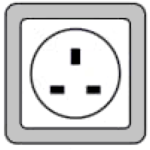Plug For Nigeria: What You Need To Know
What is the plug for Nigeria? Before you travel, check the information below to make sure your electronic devices are compatible with the outlet type and voltage.
Electrical Summary
Nigeria uses outlet types D, G at a voltage of 230V and a frequency of 50 Hz.
Plug Compatibility: Type D, Type G
Voltage: 230V
Frequency: 50 Hz
Type D

Type G

Can North Americans use Electronics in Nigeria without an Adapter?
No! North Americans will need an adapter for the outlets and a transformer for the voltage when traveling to Nigeria. North Americans device plugs will not work with the outlet types in Nigeria. Also, the voltage in Nigeria is different from North American voltages.
Can Europeans use Electronics in Nigeria without an adapter?
No! Most Europeans will need a travel adapter when traveling to Nigeria. Most device plugs will not work with the outlet types in Nigeria. However, the voltage in Nigeria is the same as in Europe.
What Outlet does Nigeria Use?
Type D

Type D plug sockets have three round pins and a grounding pin. These plugs are typically used with devices that have a voltage of 230V.
Type G

Type G plug sockets have three rectangular pins and a grounding pin. These plugs are typically used with devices that have a voltage of 230V.
Is it safe to drink water in Nigeria?
To be on the safe side, you can use common precautions such as boiling tap water for at least one minute, using water purification tablets, or drinking bottled water. It’s also important to note that ice may be made from tap water and that foods may be washed or prepared with tap water.
We recommend always packing a filtered water bottle when traveling:
Travel Essentials
Be sure to check our list of travel essentials before your trip!
Should I get travel insurance when traveling to Nigeria?
It is generally recommended to get travel insurance when traveling to a different country. Travel insurance can provide financial protection and peace of mind in case of unexpected events, such as medical emergencies, trip cancellations, lost or stolen baggage, or other travel-related mishaps.
Travel insurance can cover various expenses related to your trip, such as medical expenses, emergency medical transportation, trip cancellation or interruption, lost or stolen baggage or personal belongings, and other travel-related expenses.
Before purchasing travel insurance, it’s important to carefully review the policy details, including the coverage limits, exclusions, and any applicable deductibles or copays. You should also make sure that the policy covers any activities or destinations that you plan to participate in or visit during your trip.
Travel Summary
Visitors to Nigeria can explore the vibrant city of Lagos, which is known for its beaches, nightlife, and art scene. Other popular cities include Abuja, the capital city, and Port Harcourt, which is the center of Nigeria’s oil industry.
For those interested in history and culture, Nigeria offers a wealth of opportunities to learn about its past and present. The country is home to many historic sites, including the ancient city of Benin, the Osun-Osogbo Sacred Grove, and the Nok Culture site. Visitors can also experience Nigeria’s rich music and dance traditions, with genres ranging from highlife to afrobeats.
Nigeria’s natural beauty is also a major draw for visitors, with destinations like the Yankari National Park, the Olumo Rock, and the Idanre Hills offering opportunities for hiking and wildlife viewing. Additionally, Nigeria’s coastline is dotted with beautiful beaches, including Eleko Beach and Tarkwa Bay.
For foodies, Nigeria’s cuisine is a unique blend of traditional and modern flavors. Dishes like jollof rice, pounded yam, and suya are popular throughout the country, while street food vendors offer a variety of snacks and treats.
Overall, Nigeria is a vibrant and exciting destination that offers a blend of history, culture, and natural beauty. Its friendly people, delicious cuisine, and lively atmosphere make it a must-visit destination in West Africa.
Traveling to another country? Check out our Countries page for more info.